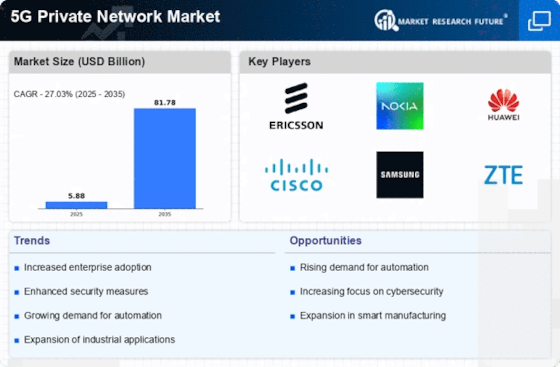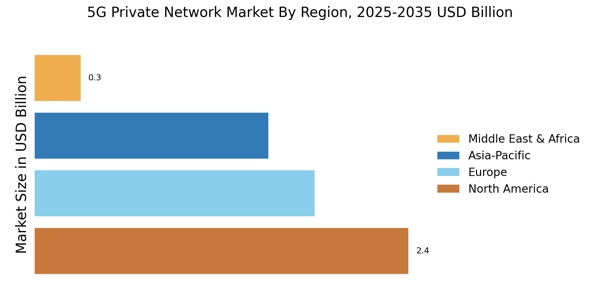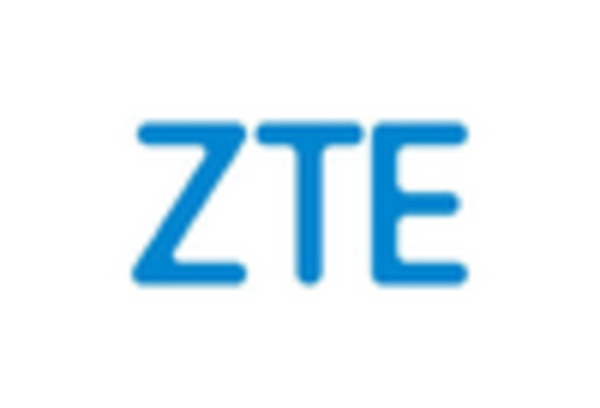Enhanced Network Security
The 5G Private Network Market appears to be driven by the increasing demand for enhanced network security. Organizations are increasingly concerned about data breaches and cyber threats, prompting them to seek private networks that offer greater control over their data. With 5G technology, businesses can implement advanced security protocols, ensuring that sensitive information remains protected. The market for cybersecurity solutions is projected to reach USD 345.4 billion by 2026, indicating a strong correlation between security needs and the growth of the 5G Private Network Market. As enterprises prioritize safeguarding their digital assets, the adoption of private networks is likely to accelerate, further solidifying their position in the telecommunications landscape.
Increased Automation and Industry 4.0
The 5G Private Network Market is poised for growth due to the rise of automation and the Industry 4.0 paradigm. As industries transition towards smart manufacturing and automated processes, the need for reliable and low-latency connectivity becomes paramount. 5G private networks provide the necessary infrastructure to support machine-to-machine communication, enabling real-time data exchange and decision-making. The global market for Industry 4.0 technologies is projected to reach USD 156.6 billion by 2024, highlighting the potential for 5G private networks to play a crucial role in this transformation. As companies invest in automation, the demand for private networks is likely to surge, driving the growth of the 5G Private Network Market.
Support for High Bandwidth Applications
The 5G Private Network Market is significantly influenced by the growing need for high bandwidth applications. Industries such as manufacturing, healthcare, and entertainment are increasingly relying on data-intensive applications that require robust connectivity. The demand for high-definition video streaming, real-time data analytics, and augmented reality applications necessitates a network infrastructure capable of supporting these requirements. According to industry estimates, the demand for high bandwidth services is expected to grow at a CAGR of 25% through 2027. This trend suggests that the 5G Private Network Market will continue to expand as organizations seek to leverage the capabilities of 5G technology to enhance operational efficiency and customer experiences.
Support for Remote Work and Collaboration
The 5G Private Network Market is increasingly driven by the need for support in remote work and collaboration. As organizations embrace hybrid work models, the demand for reliable and high-speed connectivity has surged. 5G private networks facilitate seamless communication and collaboration among remote teams, ensuring that employees can access critical resources without interruption. The rise of remote work has led to a significant increase in the use of cloud-based applications, which require robust network support. According to recent studies, the remote work market is expected to grow by 30% by 2026, indicating a strong correlation with the growth of the 5G Private Network Market. This trend suggests that as remote work becomes more entrenched, the demand for private networks will continue to rise.
Cost Efficiency and Operational Flexibility
Cost efficiency and operational flexibility are emerging as key drivers in the 5G Private Network Market. Organizations are increasingly recognizing the financial benefits of deploying private networks, which can reduce operational costs associated with traditional network infrastructures. By leveraging 5G technology, businesses can optimize their network performance while minimizing downtime and maintenance expenses. Furthermore, private networks offer the flexibility to scale operations according to business needs, allowing companies to adapt to changing market conditions. This adaptability is particularly appealing in sectors such as logistics and supply chain management, where efficiency is critical. As companies seek to enhance their bottom line, the 5G Private Network Market is likely to witness accelerated growth.

















